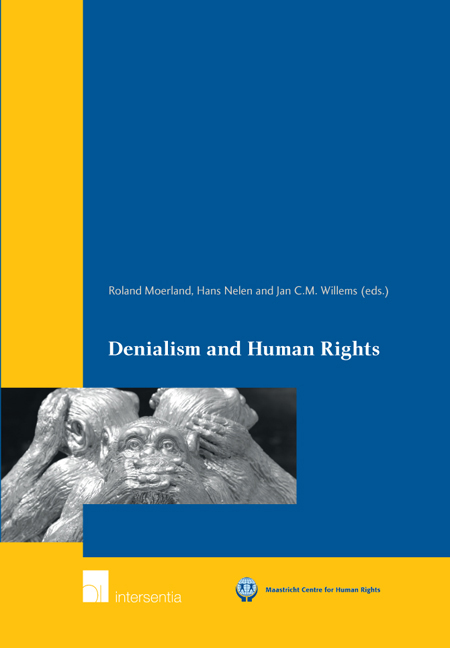Book contents
- Frontmatter
- Contents
- Acknowledgements
- Chapter I Introduction
- Chapter II Denialism and the Problem of Indifference
- Chapter III Denial and Acknowledgment in Public Responses to Information about Human Rights Violations
- PART I CHILDREN'S RIGHTS
- PART II GENOCIDE
- PART III (INTER)NATIONAL ORGANISATIONS
- PART IV NEW PENOLOGY
- PART V SOCIAL, ECONOMIC AND CULTURAL RIGHTS
- About the Authors
- Maastricht Series in Human Rights
Chapter III - Denial and Acknowledgment in Public Responses to Information about Human Rights Violations
Published online by Cambridge University Press: 19 September 2018
- Frontmatter
- Contents
- Acknowledgements
- Chapter I Introduction
- Chapter II Denialism and the Problem of Indifference
- Chapter III Denial and Acknowledgment in Public Responses to Information about Human Rights Violations
- PART I CHILDREN'S RIGHTS
- PART II GENOCIDE
- PART III (INTER)NATIONAL ORGANISATIONS
- PART IV NEW PENOLOGY
- PART V SOCIAL, ECONOMIC AND CULTURAL RIGHTS
- About the Authors
- Maastricht Series in Human Rights
Summary
INTRODUCTION
This chapter discusses denial and acknowledgment in public responses to information about human rights violations. It draws on the findings from a series of qualitative studies investigating ordinary people's understanding of, responses to (including actions and inaction), and emotional and cognitive reactions to information about human rights violations. This work complements existing theorisations of denial and offers an empirically grounded formulation of denial and acknowledgment to illustrate the varied and complex modalities in which they find expression in people's behaviours and attitudes.
The first part of the chapter briefly summarises the key features of denial in the original formulations by Freud and then developed by Cohen. In bringing these two formulations together it proposes a psychosocial theorisation of denial as generated by a conglomerate of social and psychological influences.
The second part of the chapter is dedicated to ‘acknowledgement’, the opposite of denial. It introduces the ‘3M’ model delineating the psychosocial factors fostering a ‘connectedness’ with human rights and humanitarian issues that is manageable, meaningful and sustainable for individuals.
Quotes from the studies’ participants will illustrate how people ‘do’ denial and acknowledgement, how empathy and connectedness with the sufferer is blocked through denial but also how the connectedness can be fostered and integrated into everyday morality, enabling action and ongoing active respect for human rights principles.
Questions about knowledge and action are central to any exploration of denial and acknowledgment. That is, what and how much people know about human rights violations, and what they do in response to that knowledge. Hence, at the core of formulations of denial and acknowledgement is a tension between, on the one hand, knowing and not knowing, and on the other, the self-protective ‘switching off‘ and the intentional ‘turning away’. Throughout the chapter I will return to these tensions and the dynamism between what could be paraphrased as ‘I wish but I can't’ and ‘I could but I won't’. The ‘I can't’ refers to not being able to intervene, viewed here as an automatic selfprotective defence mechanism which includes helplessness and disassociation resulting from trauma. The ‘I won't’ refers to the conscious turning away that has to be justified and accounted for.
- Type
- Chapter
- Information
- Denialism and Human Rights , pp. 25 - 48Publisher: IntersentiaPrint publication year: 2016
- 2
- Cited by



